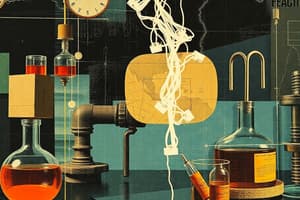Podcast
Questions and Answers
What is the primary purpose of electroplating?
What is the primary purpose of electroplating?
- To generate electricity
- To create a protective layer on materials (correct)
- To remove impurities from metals
- To extract metals from ores
In electroplating, what is the role of the electrolyte?
In electroplating, what is the role of the electrolyte?
- To act as an insulator
- To provide the necessary color to the plating
- To act as a conductor (correct)
- To dissolve the metal being plated
What happens when an electric current is passed through a conducting solution?
What happens when an electric current is passed through a conducting solution?
- The solution decomposes into its constituent ions (correct)
- The solution solidifies
- The solution heats up
- The solution evaporates
During oxidation-reduction reactions at the electrodes, where does hydrogen typically form?
During oxidation-reduction reactions at the electrodes, where does hydrogen typically form?
Which English chemist discovered the two laws of electrolysis in 1832?
Which English chemist discovered the two laws of electrolysis in 1832?
What are Faraday's laws of electrolysis mainly concerned with?
What are Faraday's laws of electrolysis mainly concerned with?
What is the relationship between the mass of a substance deposited at an electrode during electrolysis and the quantity of electric charge passed through the solution?
What is the relationship between the mass of a substance deposited at an electrode during electrolysis and the quantity of electric charge passed through the solution?
In electrolysis, what happens to the mass of a substance liberated at the electrodes when the equivalent weights of different electrolytes or elements are considered?
In electrolysis, what happens to the mass of a substance liberated at the electrodes when the equivalent weights of different electrolytes or elements are considered?
What is a significant application of electrolysis in environmental solutions?
What is a significant application of electrolysis in environmental solutions?
Which process involves using an electric current to coat a metal object with a thin layer of another metal?
Which process involves using an electric current to coat a metal object with a thin layer of another metal?
During oxidation-reduction reactions at the electrodes, where does oxygen typically form?
During oxidation-reduction reactions at the electrodes, where does oxygen typically form?
Why is understanding Faraday's laws of electrolysis important for scientists, engineers, and students?
Why is understanding Faraday's laws of electrolysis important for scientists, engineers, and students?
Study Notes
The Chemical Effects of Electric Current: Focus on Electroplating, Oxidation-Reduction Reactions, and Faraday's Laws of Electrolysis
The flow of electric current through various substances causes chemical reactions, which manifest in unique and valuable applications. Three subtopics related to the chemical effects of electric current are electroplating, oxidation-reduction reactions, and Faraday's laws of electrolysis.
Electroplating
Electroplating is a process where a layer of metal is deposited on another material using electricity. This technique is used in a variety of industries, such as jewelry production, automotive manufacturing, and electronics. The electroplating process relies on the choice of electrodes and the composition of the electrolyte. For instance, if you wish to coat gold over a material, an electrolyte containing gold and an electrode made of gold would be chosen.
Oxidation-Reduction Reactions
When an electric current is passed through a conducting solution, it causes the decomposition of the solution into its constituent ions. These ions undergo oxidation-reduction reactions at the electrodes. For example, when electric current is passed through water mixed with dissolved salts, hydrogen and oxygen are produced at the electrodes, with hydrogen forming at the cathode and oxygen at the anode.
Faraday's Laws of Electrolysis
English chemist Michael Faraday discovered two laws of electrolysis in 1832.
- First Law: The mass of any substance deposited or dissolved at an electrode during electrolysis is directly proportional to the quantity of electric charge passed through the solution.
- Second Law: When the same amount of current is passed through different electrolytes or elements connected in series, the mass of substance liberated or deposited at the electrodes is directly proportional to their equivalent weight.
These laws are important in understanding electrolysis and the factors affecting the efficiency of the process.
Electrolysis, and thus electroplating, is critical not only in industries but also in environmental applications, such as water purification and waste management. For instance, electrolysis can be used to decompose water into hydrogen and oxygen, producing a renewable and clean energy source.
Understanding the chemical effects of electric current and their applications, such as electroplating, oxidation-reduction reactions, and Faraday's laws of electrolysis, is essential for scientists, engineers, and students seeking to contribute to technological advancements and environmental solutions.
Studying That Suits You
Use AI to generate personalized quizzes and flashcards to suit your learning preferences.
Description
Test your knowledge on electroplating, oxidation-reduction reactions, and Faraday's laws of electrolysis, exploring the chemical effects of electric current. Learn about the deposition of metal layers through electroplating, the reactions caused by passing electric current through solutions, and the principles outlined by Michael Faraday in his electrolysis laws.




